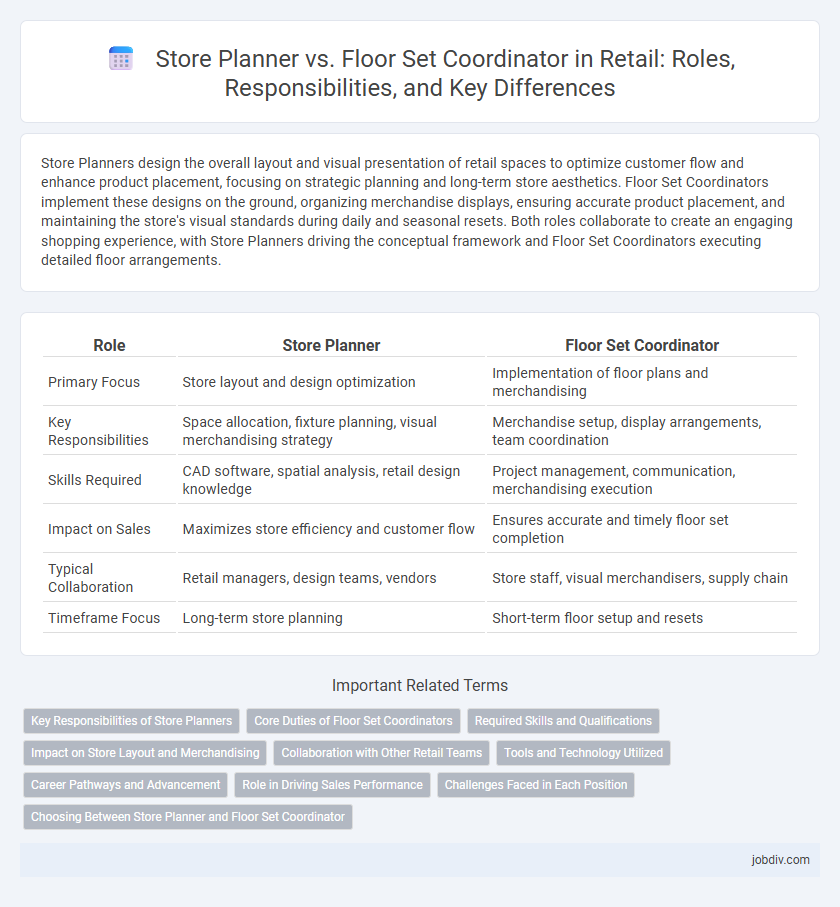Store Planners design the overall layout and visual presentation of retail spaces to optimize customer flow and enhance product placement, focusing on strategic planning and long-term store aesthetics. Floor Set Coordinators implement these designs on the ground, organizing merchandise displays, ensuring accurate product placement, and maintaining the store's visual standards during daily and seasonal resets. Both roles collaborate to create an engaging shopping experience, with Store Planners driving the conceptual framework and Floor Set Coordinators executing detailed floor arrangements.
Table of Comparison
| Role | Store Planner | Floor Set Coordinator |
|---|---|---|
| Primary Focus | Store layout and design optimization | Implementation of floor plans and merchandising |
| Key Responsibilities | Space allocation, fixture planning, visual merchandising strategy | Merchandise setup, display arrangements, team coordination |
| Skills Required | CAD software, spatial analysis, retail design knowledge | Project management, communication, merchandising execution |
| Impact on Sales | Maximizes store efficiency and customer flow | Ensures accurate and timely floor set completion |
| Typical Collaboration | Retail managers, design teams, vendors | Store staff, visual merchandisers, supply chain |
| Timeframe Focus | Long-term store planning | Short-term floor setup and resets |
Key Responsibilities of Store Planners
Store Planners are responsible for designing and optimizing store layouts to enhance customer flow and maximize product visibility, using data-driven insights and retail analytics. They create detailed floor plans, coordinate fixture placement, and ensure compliance with brand standards and safety regulations. Store Planners collaborate closely with merchandising teams and operations to implement effective space allocation strategies that drive sales performance.
Core Duties of Floor Set Coordinators
Floor Set Coordinators specialize in organizing and executing merchandise displays to maximize sales and enhance customer experience in retail stores. They oversee the physical arrangement of products, ensuring compliance with brand guidelines and seasonal promotions while coordinating with visual merchandisers and store managers. Their core duties include managing inventory placement, supervising floor set crews, and maintaining safety standards during floor resets and layout changes.
Required Skills and Qualifications
Store Planners require strong analytical skills, proficiency in CAD software, and an in-depth understanding of retail space optimization to design effective store layouts. Floor Set Coordinators focus on team leadership, time management, and a detailed knowledge of merchandising standards to efficiently execute floor plans and maintain visual presentation. Both roles demand excellent communication skills and a solid grasp of retail operations to enhance customer experience and drive sales.
Impact on Store Layout and Merchandising
A Store Planner strategically designs the overall store layout to maximize traffic flow, product visibility, and customer experience, directly influencing long-term merchandising effectiveness. The Floor Set Coordinator implements detailed floor arrangements and quick merchandise resets, ensuring the planned layout aligns with daily operational needs and promotional strategies. Their combined efforts optimize store aesthetics, drive sales, and enhance shopper engagement through precise spatial organization and timely merchandise presentation.
Collaboration with Other Retail Teams
Store Planners collaborate closely with merchandise managers and visual merchandisers to design store layouts that maximize product visibility and sales flow. Floor Set Coordinators work directly with store managers and sales associates to implement planograms and ensure precise placement of products according to the planned design. Both roles require seamless communication with inventory and marketing teams to align promotional strategies and inventory availability for optimal in-store execution.
Tools and Technology Utilized
Store Planners leverage advanced CAD software and 3D modeling tools to design efficient retail layouts and optimize space utilization, enhancing customer flow and product placement. Floor Set Coordinators primarily use inventory management systems and handheld scanning devices to execute planograms, ensure accurate product displays, and streamline restocking processes. Both roles depend on retailer-specific software platforms to communicate updates and maintain consistency in store presentation.
Career Pathways and Advancement
Store Planners typically focus on the strategic layout and design of retail spaces, utilizing data analytics and consumer behavior insights to optimize store performance and customer experience. Floor Set Coordinators are primarily responsible for the execution and maintenance of these plans, managing merchandising displays and product placements on the sales floor. Career advancement for Store Planners often leads to roles in retail management or corporate planning, while Floor Set Coordinators can progress to supervisory or regional merchandising positions, both pathways requiring expertise in visual merchandising and operational efficiency.
Role in Driving Sales Performance
Store Planners analyze customer flow and product placement to maximize sales opportunities through strategic store layouts. Floor Set Coordinators execute visual merchandising plans by arranging displays and ensuring product presentation aligns with marketing goals. Both roles collaborate to enhance shopper experience, directly influencing sales performance and store profitability.
Challenges Faced in Each Position
Store Planners face challenges such as accurately forecasting space requirements and integrating technology for efficient store layouts, which demands strong analytical skills and cross-department collaboration. Floor Set Coordinators contend with tight deadlines and constant adjustments to product placements based on inventory changes and promotional events, requiring excellent organizational skills and adaptability. Both roles must navigate supply chain disruptions and evolving consumer preferences to maintain optimal store presentation and sales performance.
Choosing Between Store Planner and Floor Set Coordinator
Choosing between a Store Planner and Floor Set Coordinator depends on the scope of retail operations and project needs. Store Planners specialize in strategic layout design and space optimization to maximize customer flow and sales, while Floor Set Coordinators focus on implementing planograms and managing product displays on the sales floor. Retailers with extensive remodeling or expansion projects benefit from Store Planners, whereas daily merchandising updates and seasonal resets require the expertise of Floor Set Coordinators.
Store Planner vs Floor Set Coordinator Infographic

 jobdiv.com
jobdiv.com